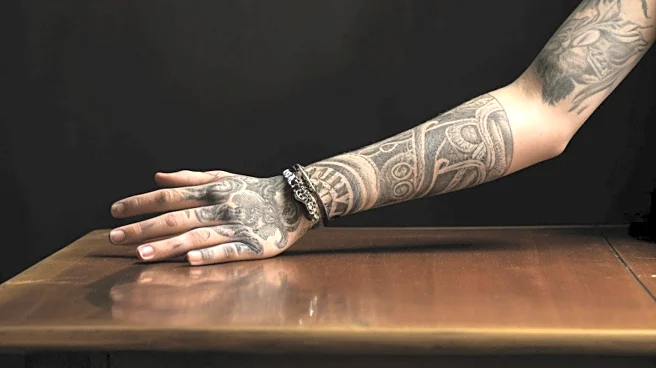What is the story about?
What's Happening?
South Korea's parliament is preparing to vote on a bill that would legalize tattooing, a profession that has been illegal for decades despite its growing popularity. Currently, only medical professionals are allowed to perform tattooing under South Korean law. The bill aims to formally license tattoo artists and require training on hygiene and safety. The tattoo industry in South Korea has flourished in the shadows, with artists gaining international recognition and awards. Despite the ban, tattoos have become increasingly popular among younger South Koreans, and the industry is estimated to be worth 200 billion Korean won annually. The bill has cleared several legislative hurdles and now awaits approval in the National Assembly.
Why It's Important?
The legalization of tattooing in South Korea represents a significant cultural shift, reflecting changing attitudes towards tattoos and body art. The bill's passage could provide legal recognition and protection for tattoo artists, allowing them to work openly and without fear of legal repercussions. This change could also boost the tattoo industry, attracting more international clients and contributing to the country's economy. The legalization may also influence public perceptions, reducing the stigma associated with tattoos and promoting them as a form of artistic expression.
What's Next?
If the bill passes, the government will have two years to develop regulations for the tattoo industry, including guidelines on hygiene, safety, and required qualifications for artists. The industry may experience a temporary gray zone where tattooing is technically legal but not yet regulated. Artists and stakeholders will likely engage in discussions to ensure the new regulations protect both clients and practitioners. The bill's approval could also lead to increased interest and investment in the tattoo industry, further integrating it into South Korea's cultural landscape.
Beyond the Headlines
The potential legalization of tattooing in South Korea highlights broader cultural and societal changes, as traditional views on body art evolve. The move may prompt discussions about the role of art and personal expression in society, challenging long-standing taboos and encouraging greater acceptance of diverse forms of self-expression. The legalization could also influence other countries in the region, potentially leading to similar reforms and shifts in cultural attitudes towards tattoos.
















